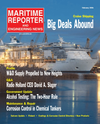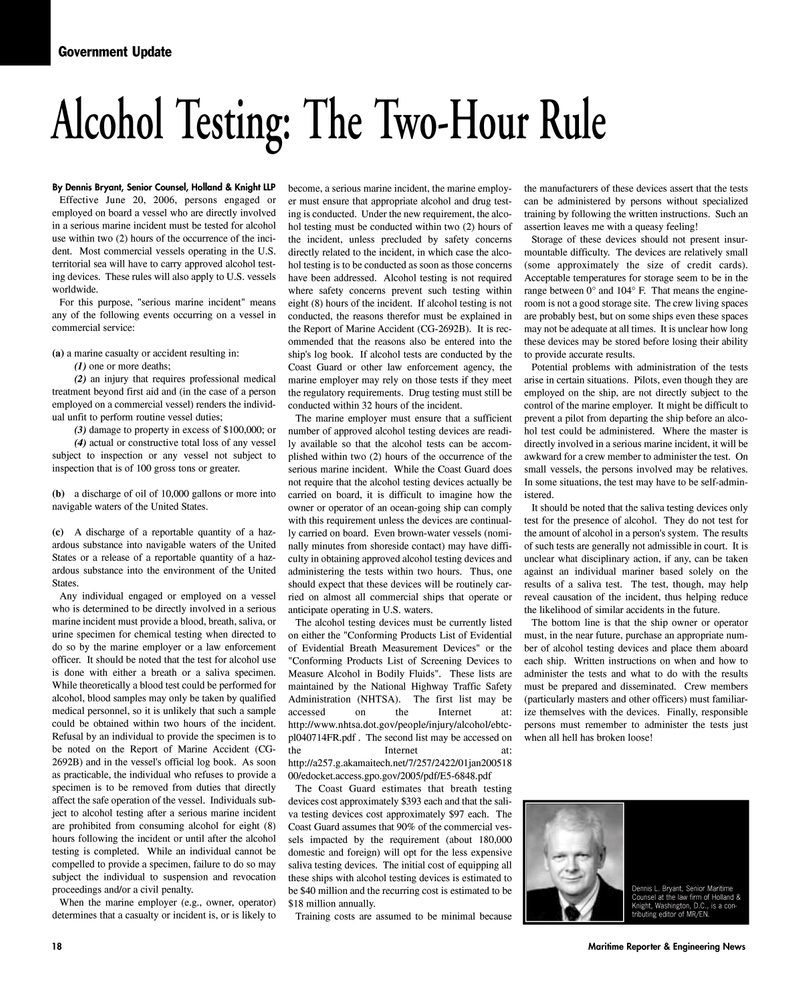
Page 18: of Maritime Reporter Magazine (February 2, 2006)
Read this page in Pdf, Flash or Html5 edition of February 2, 2006 Maritime Reporter Magazine
By Dennis Bryant, Senior Counsel, Holland & Knight LLP
Effective June 20, 2006, persons engaged or employed on board a vessel who are directly involved in a serious marine incident must be tested for alcohol use within two (2) hours of the occurrence of the inci- dent. Most commercial vessels operating in the U.S. territorial sea will have to carry approved alcohol test- ing devices. These rules will also apply to U.S. vessels worldwide.
For this purpose, "serious marine incident" means any of the following events occurring on a vessel in commercial service: (a) a marine casualty or accident resulting in: (1) one or more deaths; (2) an injury that requires professional medical treatment beyond first aid and (in the case of a person employed on a commercial vessel) renders the individ- ual unfit to perform routine vessel duties; (3) damage to property in excess of $100,000; or (4) actual or constructive total loss of any vessel subject to inspection or any vessel not subject to inspection that is of 100 gross tons or greater. (b) a discharge of oil of 10,000 gallons or more into navigable waters of the United States. (c) A discharge of a reportable quantity of a haz- ardous substance into navigable waters of the United
States or a release of a reportable quantity of a haz- ardous substance into the environment of the United
States.
Any individual engaged or employed on a vessel who is determined to be directly involved in a serious marine incident must provide a blood, breath, saliva, or urine specimen for chemical testing when directed to do so by the marine employer or a law enforcement officer. It should be noted that the test for alcohol use is done with either a breath or a saliva specimen.
While theoretically a blood test could be performed for alcohol, blood samples may only be taken by qualified medical personnel, so it is unlikely that such a sample could be obtained within two hours of the incident.
Refusal by an individual to provide the specimen is to be noted on the Report of Marine Accident (CG- 2692B) and in the vessel's official log book. As soon as practicable, the individual who refuses to provide a specimen is to be removed from duties that directly affect the safe operation of the vessel. Individuals sub- ject to alcohol testing after a serious marine incident are prohibited from consuming alcohol for eight (8) hours following the incident or until after the alcohol testing is completed. While an individual cannot be compelled to provide a specimen, failure to do so may subject the individual to suspension and revocation proceedings and/or a civil penalty.
When the marine employer (e.g., owner, operator) determines that a casualty or incident is, or is likely to become, a serious marine incident, the marine employ- er must ensure that appropriate alcohol and drug test- ing is conducted. Under the new requirement, the alco- hol testing must be conducted within two (2) hours of the incident, unless precluded by safety concerns directly related to the incident, in which case the alco- hol testing is to be conducted as soon as those concerns have been addressed. Alcohol testing is not required where safety concerns prevent such testing within eight (8) hours of the incident. If alcohol testing is not conducted, the reasons therefor must be explained in the Report of Marine Accident (CG-2692B). It is rec- ommended that the reasons also be entered into the ship's log book. If alcohol tests are conducted by the
Coast Guard or other law enforcement agency, the marine employer may rely on those tests if they meet the regulatory requirements. Drug testing must still be conducted within 32 hours of the incident.
The marine employer must ensure that a sufficient number of approved alcohol testing devices are readi- ly available so that the alcohol tests can be accom- plished within two (2) hours of the occurrence of the serious marine incident. While the Coast Guard does not require that the alcohol testing devices actually be carried on board, it is difficult to imagine how the owner or operator of an ocean-going ship can comply with this requirement unless the devices are continual- ly carried on board. Even brown-water vessels (nomi- nally minutes from shoreside contact) may have diffi- culty in obtaining approved alcohol testing devices and administering the tests within two hours. Thus, one should expect that these devices will be routinely car- ried on almost all commercial ships that operate or anticipate operating in U.S. waters.
The alcohol testing devices must be currently listed on either the "Conforming Products List of Evidential of Evidential Breath Measurement Devices" or the "Conforming Products List of Screening Devices to
Measure Alcohol in Bodily Fluids". These lists are maintained by the National Highway Traffic Safety
Administration (NHTSA). The first list may be accessed on the Internet at: http://www.nhtsa.dot.gov/people/injury/alcohol/ebtc- pl040714FR.pdf . The second list may be accessed on the Internet at: http://a257.g.akamaitech.net/7/257/2422/01jan200518 00/edocket.access.gpo.gov/2005/pdf/E5-6848.pdf
The Coast Guard estimates that breath testing devices cost approximately $393 each and that the sali- va testing devices cost approximately $97 each. The
Coast Guard assumes that 90% of the commercial ves- sels impacted by the requirement (about 180,000 domestic and foreign) will opt for the less expensive saliva testing devices. The initial cost of equipping all these ships with alcohol testing devices is estimated to be $40 million and the recurring cost is estimated to be $18 million annually.
Training costs are assumed to be minimal because the manufacturers of these devices assert that the tests can be administered by persons without specialized training by following the written instructions. Such an assertion leaves me with a queasy feeling!
Storage of these devices should not present insur- mountable difficulty. The devices are relatively small (some approximately the size of credit cards).
Acceptable temperatures for storage seem to be in the range between 0° and 104° F. That means the engine- room is not a good storage site. The crew living spaces are probably best, but on some ships even these spaces may not be adequate at all times. It is unclear how long these devices may be stored before losing their ability to provide accurate results.
Potential problems with administration of the tests arise in certain situations. Pilots, even though they are employed on the ship, are not directly subject to the control of the marine employer. It might be difficult to prevent a pilot from departing the ship before an alco- hol test could be administered. Where the master is directly involved in a serious marine incident, it will be awkward for a crew member to administer the test. On small vessels, the persons involved may be relatives.
In some situations, the test may have to be self-admin- istered.
It should be noted that the saliva testing devices only test for the presence of alcohol. They do not test for the amount of alcohol in a person's system. The results of such tests are generally not admissible in court. It is unclear what disciplinary action, if any, can be taken against an individual mariner based solely on the results of a saliva test. The test, though, may help reveal causation of the incident, thus helping reduce the likelihood of similar accidents in the future.
The bottom line is that the ship owner or operator must, in the near future, purchase an appropriate num- ber of alcohol testing devices and place them aboard each ship. Written instructions on when and how to administer the tests and what to do with the results must be prepared and disseminated. Crew members (particularly masters and other officers) must familiar- ize themselves with the devices. Finally, responsible persons must remember to administer the tests just when all hell has broken loose! 18 Maritime Reporter & Engineering News
Government Update
Alcohol Testing: The Two-Hour Rule
Dennis L. Bryant, Senior Maritime
Counsel at the law firm of Holland &
Knight, Washington, D.C., is a con- tributing editor of MR/EN.
MR FEBRUARY2006 #3 (17-24).qxd 2/1/2006 7:31 PM Page 18

 17
17

 19
19
